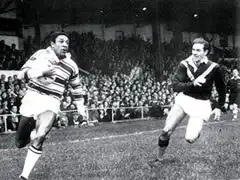Clive Sullivan: The Cardiff boy who captured Hull hearts

Later this month, Hull FC and Hull Kingston Rovers will continue their preseason preparations with a ‘friendly’ clash at the KC Stadium.
The two teams will contest the Clive Sullivan Trophy, named in honour of one of both clubs’ most iconic players.
There is so much richness and imspiration in the Sullivan legend it is hard to know where to start.
The story tells how the son of immigrants in the village of Splott, near Cardiff, rose from humble beginnings to become a true league hero, and how he overcame childhood disablity to become one of the game’s most prolific wingers.
Unlike many other sporting icons, Sullivan struggled to play sport in his childhood, where operations on his knees and other joints kept him on the sidelines.
It was when he joined the British Army that his rugby career took off, when he was named in an inter-corps rugby union game taking place at Catterick. With the Army ignorant of his childhood operations, he was named in the team simply by virtue of being Welsh.
Although he wanted to play badly to avoid being picked again, his competitive instincts meant that he turned in a superb display, and soon he was handed a trial at Bradford Northern.
When that didn’t work out, he was signed by Hull FC in 1961, and the scene was set for a marvellous career.
After the first three years of his Hull career was disrupted by Army commitments and injuries, he blossomed, and went on to play a total of 352 games for Hull, scoring 250 tries.
In 1974, he would move across the city to Hull KR, and went on to play 213 games the Robins, scoring 118 tries. He was also a part of the 1980 Wembley Robins, who beat Hull FC 10-5 in the Challenge Cup final.
Along the way, Sullivan became the first black man to captain a British national team, when he led Great Britain to victory in the 1972 World Cup, the last time a UK team won the trophy.
His death from liver cancer in 1985, at the tragically young age of 42 and only six months after he retired from playing, hit Hull hard as a city. His funeral was a mass of red and white and black and white team colours.
Former Hull FC scrum-half Kevin Harkin perhaps sums up better than anyone just what Clive Sullivan means to the city of Hull and its rugby league community.
“What more can be said about Clive Sullivan?” he said.
“He was a great player and a great man, I was lucky enough to play with him in the latter stages of his historic career at the Boulevard.
“The greatest tribute to him is that he is as much loved in Hull by Black and Whites and Red and Whites equally.”
The depth of feeling that exists for the great Welsh winger in East Yorkshire is shown by the fact that the A63 between the Humber Bridge and the city centre is named Clive Sullivan Way in his honour.
So fans who travel to Hull to watch our great game are, in a strange way, being guided along by Clive, which is fitting for such a bright light of rugby league.